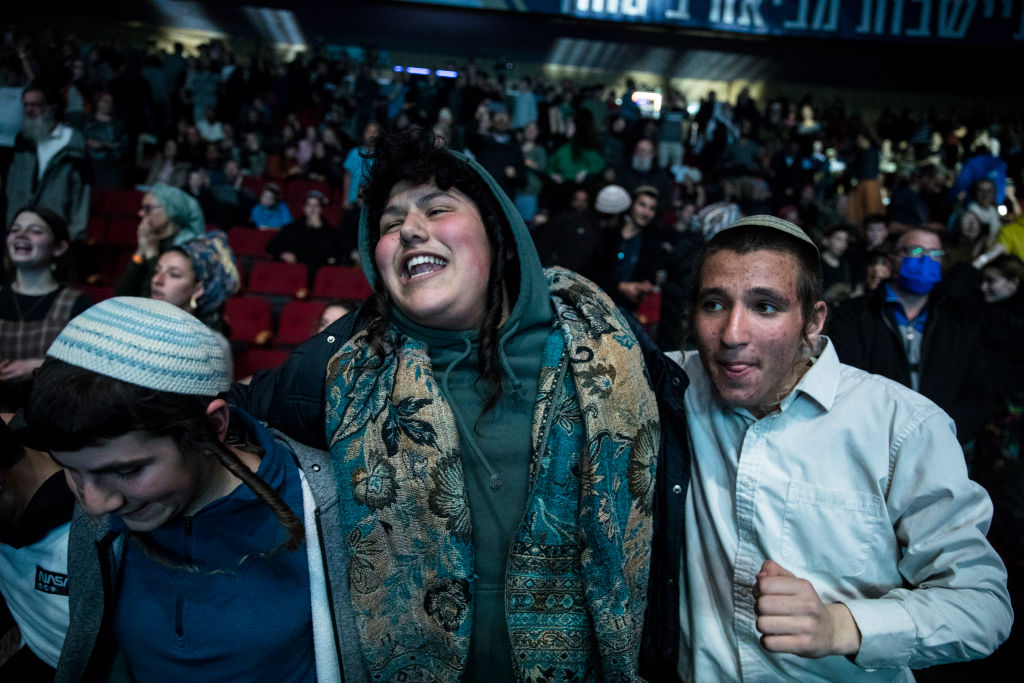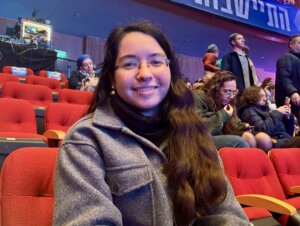For God and country: War reignites fringe movement to resettle Gaza
What was once heralded as a divine mandate is now being sold as a strategic imperative

Far-right activists attend a convention this week in Jerusalem calling for Israel to resettle Gaza. Photo by Amir Levy/Getty Images
JERUSALEM — Efrat Cohen has a clear vision of what she calls “the right and only thing” her country can do to end its war on Hamas and thwart another attack like Oct. 7.
“We need to retake control of Gaza, obviously,” said Cohen, who is 26 and lives in Beit Shemesh, a religious town between Jerusalem and Tel Aviv. She acknowledged that could mean displacing some of the strip’s 2.1 million Palestinian residents — a prospect, she said, that is “too bad for them.”
Cohen, a computer-networking student, is among a fringe group of religious Israelis who long have supported rebuilding settlements in the Gaza Strip as a biblical mandate. She and others on the political far right are now trying to leverage Israel’s latest war with Hamas to propel that agenda into a strategic imperative, arguing that having armed settlers in the strip — and military installations to protect them — could prevent future attacks.
A poll Channel 12 news published this week found 38% of Israelis support resettlement in Gaza.
Ehud Eiran, a political scientist at the University of Haifa, said the religious right sees in the war an opportunity to reframe its agenda for a broader audience “because there’s no agreed-upon endgame about what’s happening in Gaza.”
“The prime minister hasn’t made that clear,” he explained. “So where there’s a void, people go into it. And it’s an argument that non-religious people are starting to listen to for security reasons.”
More of the scene at the conference... pic.twitter.com/ubFhp7bOOG
— The Forward (@jdforward) January 31, 2024
Some 2,000 people flocked Sunday to a conference in Jerusalem for the loudest and most high-profile event yet to rally support for resettlement. The crowd included influential rabbis, relatives of people murdered or abducted on Oct. 7 and soldiers killed in combat since, and busloads of yeshiva students, many who said they hope to raise their future children in Gaza.
Fifteen Knesset members were in attendance, including 11 cabinet ministers and several members of Prime Minister Benjamin Netanyahu’s Likud party.
“We need to go back home because that’s the Torah, that’s historical justice and that’s what’s right,” Itamar Ben-Gvir, the far-right minister of national security, said from the stage. “Today everyone understands that running away brings war.”
Bezalel Smotrich, the ultranationalist finance minister, added: “Without settlement, there is no security.”

Israel seized the 141-square-mile coastal enclave in the 1967 war, and began building settlements there a few years later. But in 2005, under then-Prime Minister Ariel Sharon’s disengagement plan, 21 settlements were dismantled and their 9,000 residents removed, a handful of them forcibly, by Israeli soldiers.
It was a painful chapter of Israel’s history. Within two years, Hamas wrested control of Gaza from the Palestinian Authority, and began intermittently sending barrages of rockets toward Israeli cities and towns. Israel has sent troops into Gaza three times — in 2008, 2014 and last fall — and has maintained restrictions on travel and trade into and out of the strip ever since.
A handful of zealous former members of the Gaza settlement bloc known as Gush Katif have always harbored dreams of returning. Other right-leaning Israeli Jews used the rocket attacks that followed disengagement as an argument against pulling back from any settlements in the occupied West Bank, but stopped short of calling to rebuild Gush Katif. Until now.
A coalition of religious Zionist groups has drawn up a new plan to enable hundreds of thousands of Israelis to move into Gaza starting, they say, as soon as possible. The plan calls for the building of one settlement on the Mediterranean coast in Gaza’s south; another just outside the northeastern Gaza city of Beit Hanoun, which has been largely destroyed by Israeli airstrikes; a third near Khan Younis, the southern town that served as headquarters for many Hamas commanders; and a fourth, near Rafah and the Egyptian border, specifically for Haredi Jews.
The coalition includes the Samaria Regional Council, which governs Israeli settlements in the northern West Bank and has recently been distributing assault weapons to civilian security guards there; and the Nachala settlement movement, a group reported by Haaretz to have used dark money to seed unauthorized settlements in the West Bank.
Nachala’s director, Daniella Weiss, said that more than 500 families so far have volunteered to resettle in Gaza. Of those, 100 signed up in the past week.
Weiss, a longtime activist who has helped spawn many illegal outposts in the occupied West Bank and is an ally and neighbor of Smotrich, envisions a “paradise on earth” thriving from industry, agriculture and tourism in Gaza, a stark contrast to what she calls the “hell” Palestinians have let it devolve into.
Palestinians, she and other speakers said, would be encouraged to leave.
“Instead of the Arab population, it would be Jewish population,” she said in an interview on Wednesday.
Ben-Gvir, a West Bank settler who has called for the expulsion from Israel of Arab citizens who are not loyal, spoke of offering financial incentives to prod Palestinians to leave Gaza, as well as a law allowing Israel to execute terrorists.
Netanyahu, for his part, has downplayed the possibility of resettling Gaza but insisted that Israel maintain security control over it. Asked about the attendance at Sunday’s conference of politicians from his party and government, a spokesperson for the prime minister said only that they are “entitled to their opinions.”
The gathering had a revivalist feel, with kids pogo-ing to live music and the crowd cheering at videos of early settlement pioneers tilling soil in Gaza. Footage of Gazan buildings exploding from recent Israeli strikes prompted extra applause and chanting from the audience.
About 2,000 attended a conference in Jerusalem rallying for resettling Gaza. “Palestinians know about donkeys, not about governing themselves. None of us are safe until we have settlements” in Gaza, said David Miller, “and, ultimately, they’re all gone.” (?️ @Greeneindenver) pic.twitter.com/sBY9Dl1iDL
— The Forward (@jdforward) January 31, 2024
Some in the crowd openly carried weapons, which is not uncommon in Israel, but has been more prevalent since Oct. 7. One man cleaned his gun while waiting for a speech to start.
The conference, like the resettlement movement in general, has drawn sharp criticism from centrist and secular leaders. Yair Lapid, who spent six months as prime minister in 2022 and now is head of the opposition, slammed the Knesset members who attended Sunday’s conference for having reached what he called “a new low.”
He and critics throughout the country said talk of resettling Gaza risks undermining sensitive hostage negotiations and fueling distrust of the most religious and right-wing government in Israel’s history. They note that the resettlement agenda runs counter to the two-state solution backed by the United States and most of the international community.
Some critics also wince that it seems tone deaf, if not heartless, for thousands of Israels to have been dancing in the aisles Sunday calling for a “voluntary migration” or “transfer” of Gaza residents, given the death, destruction and humanitarian crisis now gripping the territory. The Gaza health ministry says at least 26,000 Palestinians there have been killed since Oct. 7, most of them civilians; and international officials say some 2 million have been displaced by the war, and warn of severe famine and other health crises as heavy rain and cold temperatures continue into a second week.
“Every struggle that divides the people gives support to our enemies and encourages them to persevere in their war,” Pinchas Wallerstein, who worked in the settlement movement for 35 years, said in a statement this week. “The call for settlements in the Gaza Strip at this time is tearing people apart, and at an hour when our soldiers fight and pay in blood for sovereignty for the people of Israel in their own land.”
Attendees at Sunday’s conference seemed unconcerned with criticism.
Cohen, the 26-year-old student from Beit Shemesh, said opponents of resettlement “don’t know what they’re talking about.”
“I don’t think you can print this, but they’re full of crap,” offered David Miller, 71, who made aliyah from Springfield, Massachusetts, 41 years ago and also lives in Beit Shemesh. “Palestinians know about donkeys, not about governing themselves. None of us are safe until we have settlements” in Gaza, he added, “and, ultimately, they’re all gone.”
Miller said the conferencegoers had nothing to apologize for by dancing.
“This is not a small radical (movement) at all. This is the people’s choice,” he said. “The people are talking. This is, this is us, the grassroots. And we celebrate for good reason here today because we all know something great is coming on.”
Odeya Rosenband assisted with translation.
















